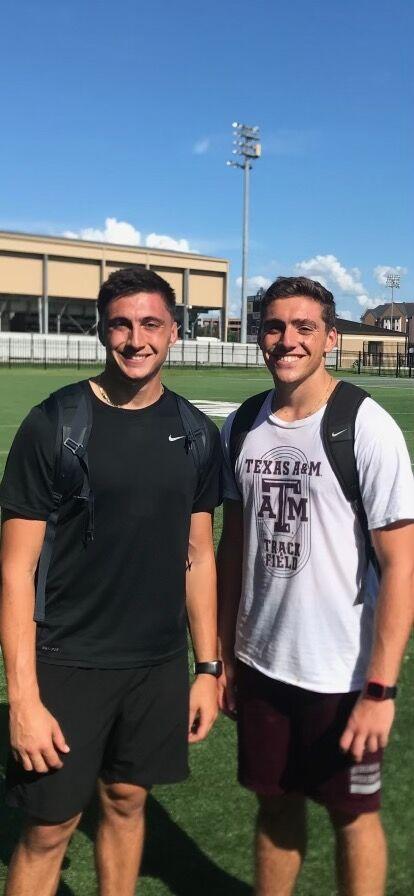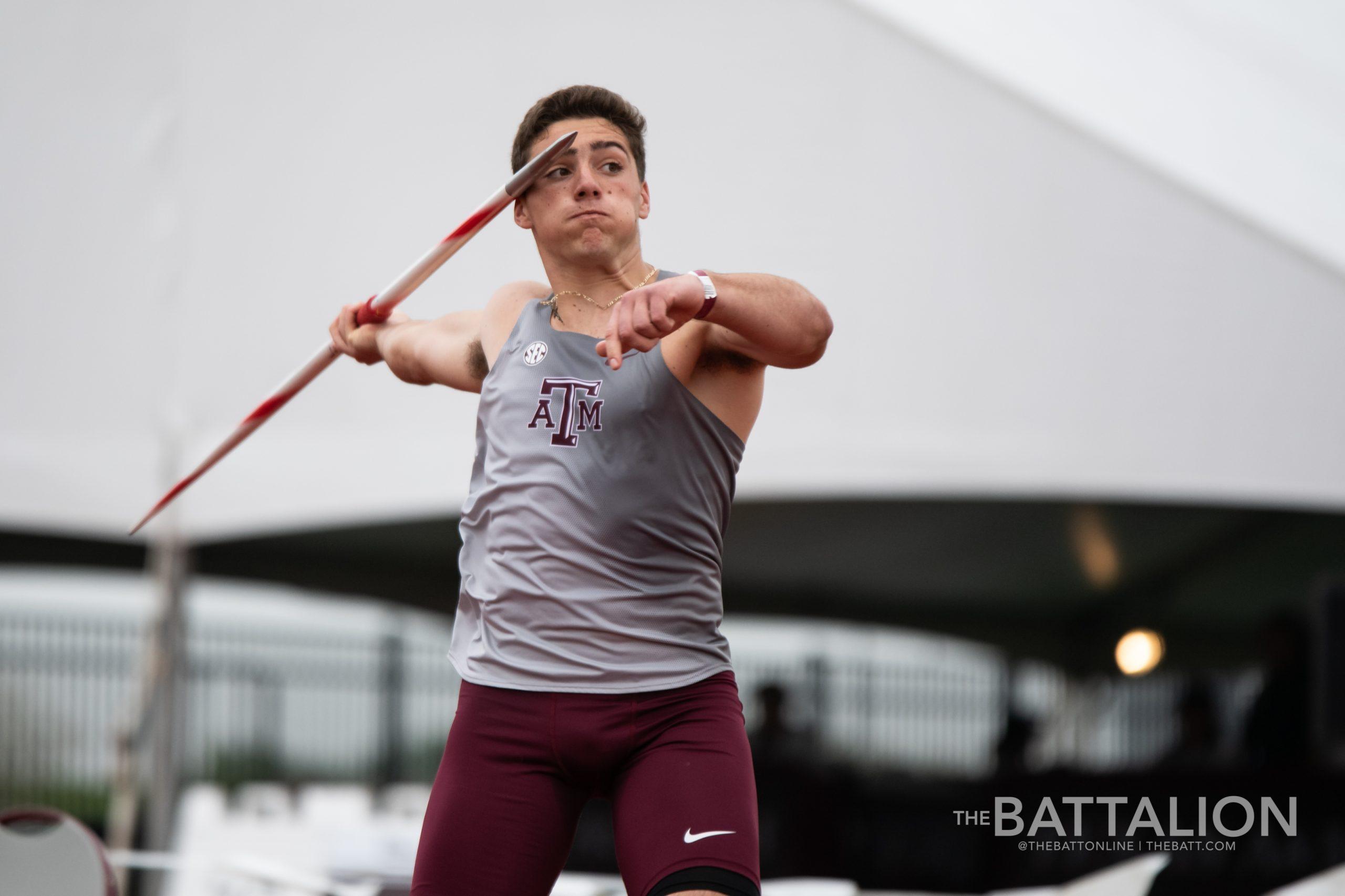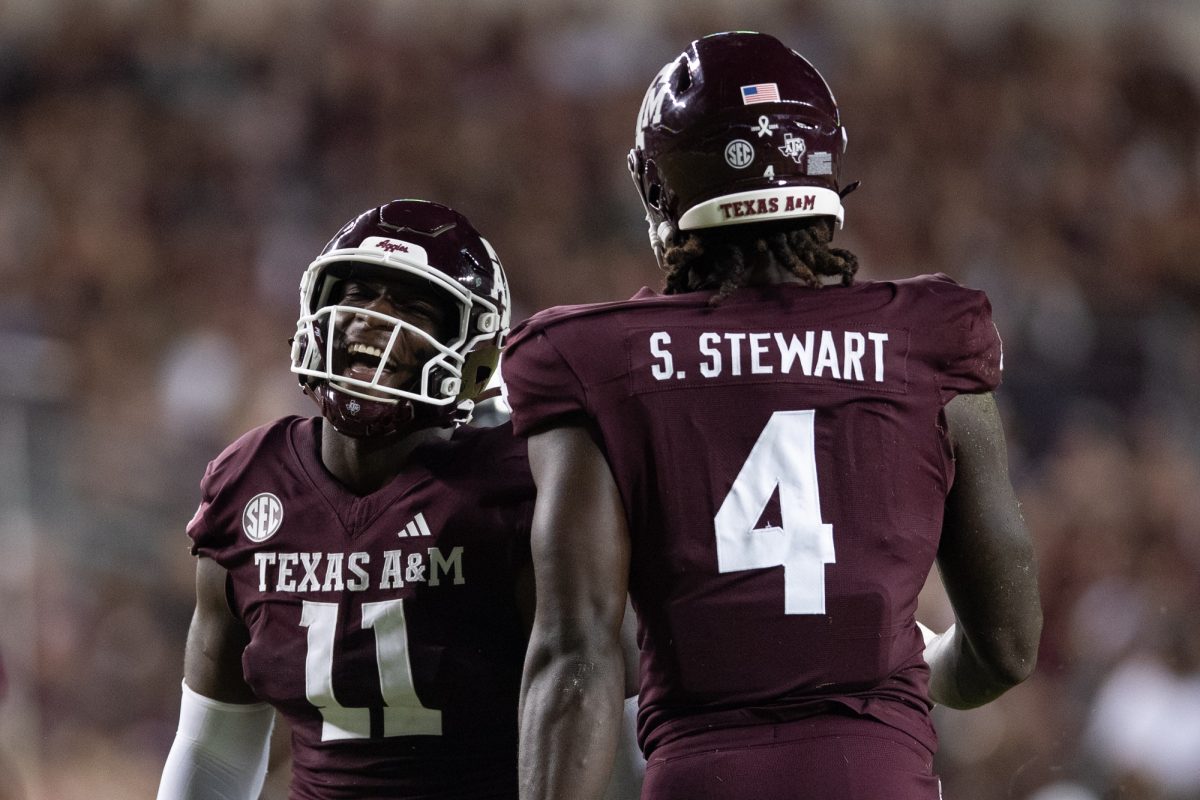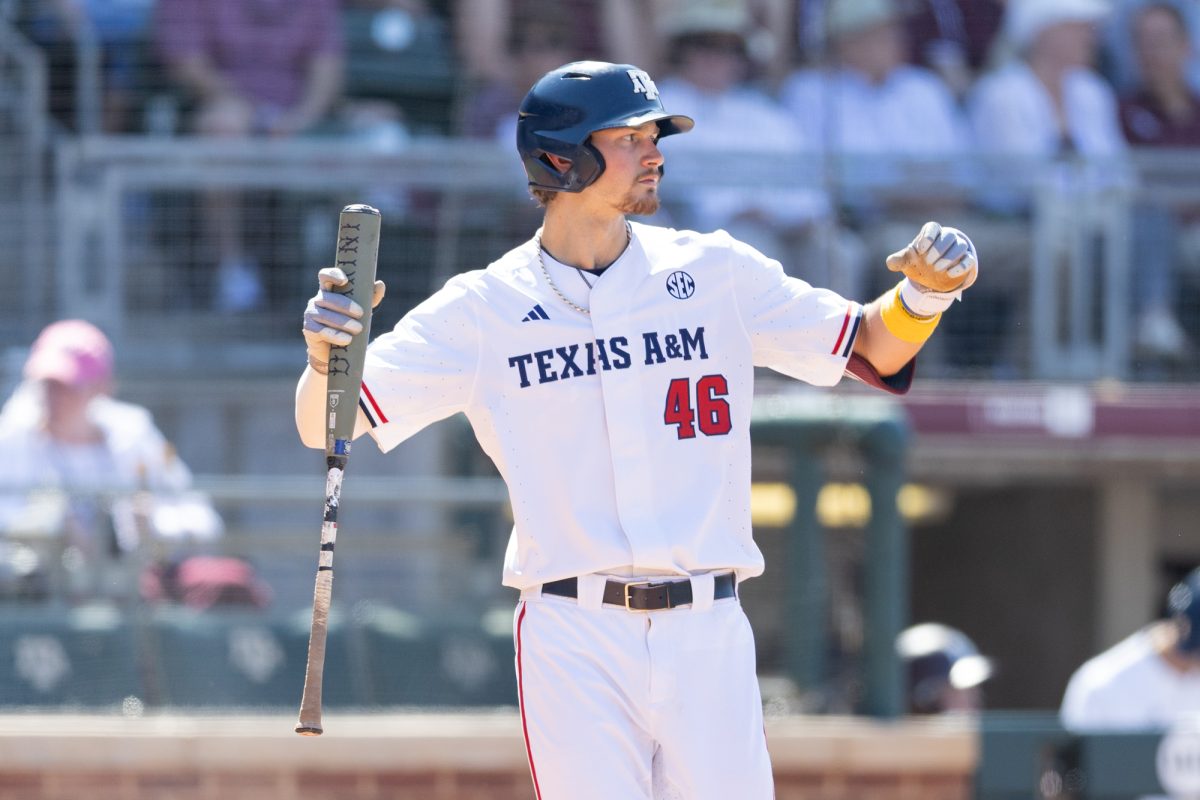Every athlete faces adversity of varying degrees at some point during their career. The question is: When will it rear its ugly head, and just how hard will it be to face and overcome? For Texas A&M track and field junior Nickolas Mirabelli, adversity came unexpectedly in a multitude of ways that have kept him from throwing a javelin competitively for nearly three years.
Nick’s freshman year went about as well as you could expect for someone going into their first year of collegiate competition. He placed seventh in the SEC Championships, competed in the NCAA West Regionals, won a bronze medal at the USA Track and Field U20 Championships and claimed the 10th-best throw in program history.
Then, everything changed.
COVID-19 wiped out Nick’s sophomore year of competition. He, along with many others across the country, returned the following season ready to show their growth and development with hopes of getting back to the postseason and beyond.
But a season-ending torn labrum in his throwing shoulder, suffered before the 2021 season began, took the javelin out of his hands once again, leaving him to wonder what could have been.
“It was difficult, but it’s more mental because, when you’re out for two years, you just have that urge to compete,” Nick said. “Especially as a college athlete, that’s what you’re going to school for — that’s the main goal. So, having that taken away was a major setback.”
The story goes much deeper than just the past couple years, though. It truly begins with Nick’s family: His parents Karen and Mark, and his brother Chris, especially. The three of them have instilled ideals and a purpose inside Nick that has brought him back to the point he is at now — about to finally return after a process that Nick described in one word.
“Long.”
The Parents
Nick’s story in the sport starts with his father Mark.
Mark has taught javelin, shotput and discus throwing for nearly 40 years, and runs his own successful personal training business, the Mark Mirabelli Track and Field Throwing School in Lumberton, N.J., which brings in clients from all over the country and has helped develop countless kids into college athletes.
Before training, he himself threw the javelin at such a high level that he was a qualifier for the 1980 Summer Olympic Game Trials. Those games, of course, were boycotted and never happened.
It’s a strange comparison when looking at the 1980 Games and the postponement of the 2020 Olympics. Chris was planning on making a run at those games himself before they were suspended.
“It’s just an amazing story that Mark made the Olympic Trials exactly 40 years ago, and they were boycotted,” Karen said. “Then the 2020 Olympic Trials come and COVID-19 hits. It’s been like [a] curse.”
So, it goes without saying that Nick and Chris were both born into the sport of throwing. They were involved with Mark and his immense, deep knowledge from a young age which allowed them to grasp as much about the ins-and-outs of throwing as possible.
“Ever since [Nick] was five years old, he’s been coming with me to practice. They already knew a lot about the javelin, and I taught him at a young age how to hold it and how to do other things correctly,” Mark said. “They have a great advantage over anybody else having a father that’s a personal trainer.”
As a result, the brothers, together, have enjoyed a wealth of success and accomplishments up to this point.
Mark recalled a pair of moments he said particularly stuck with him — Chris winning a gold medal at the 2016 Pan-American Games and Nick breaking the New Jersey state record for javelin throw.
“I cried like a baby when [Chris] was standing on the top of the podium with his hand on his heart, looking at the flag, going up and playing the national anthem,” Mark said. “That was [an] unbelievable feeling and comparing that to [Nick] breaking the record his senior year, that was another moment where I was just as proud.”
But none of those special moments can prepare you for seeing your child suffer an injury and be forced out of the sport they’ve done for so long as a family, Mark said.
“It’s never easy as a parent,” Mark said. “We’ve had a number of things that we’ve dealt with, and we get through it and just hope for the best. We take a deep breath, and we try to encourage. You’re going to have to go through the process again in order to get back to you. But, you just take it one day at a time.”
He said he wants one thing above all else though: for Nick to be healthy.
“I want him to be healthy with no injuries — knock on wood — and open up at a slow rate,” Mark said. “I don’t want him to put the pressure on himself to throw big giant throws right off the bat. Little increments at a time. He sends me clips every day of his practice, and I can see so much improvement in them and his technique. I think he’s going to surprise a lot of people.”
Nick said much of the same, but he’s matured a great deal with the challenges he’s had to face. He’s got to be smart about what he chooses to do as he gets back to being competition-ready, Nick said.
“I came in from high school thinking I would be better than everybody. I just had a freshman attitude,” Nick said. “But now that I’ve been through a lot of adversity, I think I make a lot of smarter decisions. I’ve got to pace myself throughout the year even though I’m very excited about this season.”
It’s important for one to have the proper disposition and temperament when going through tough times. Karen said she believes Nick’s attitude is a big part of the reason why he can continue to deal with adversity.
“He just has a really good attitude,” Karen said. “He’s the kid that smiles all the time on the field, ever since he was a little kid. He would strike out in baseball and walk away smiling or tackle somebody in football and smile at him and pick them up. I’d say, ‘Nick, you’ve got to stop smiling, you’ve got to be mean.’ I couldn’t do what Nick does. It’s rare to be able to have that ability and still have a killer drive.”
But, as previously mentioned, Karen and Mark are just one part of Nick’s story and why he’s been able to adapt and overcome life’s inevitable obstacles.
The Brother
To put it simply, Chris Mirabelli is a decorated and successful athlete. He threw the javelin for Rutgers from 2014-19 and racked up numerous accolades.
Chris holds Rutgers’ record for longest javelin throw at 76.67 meters, is a three-time Big 10 champion, a four-time All-American, was a 2017 and 2019 USA Championships finalist and now throws professionally.
Chris also has a master’s degree from Rutgers in sports business and is engaged to Casey Murphy, a goalkeeper for the U.S. Women’s National Team and member of the National Women’s Soccer League’s North Carolina Courage.
But much like Nick, Chris’ story is one of adversity heaped upon adversity that seems to have no way to escape.
“He’s been through more problems [than me],” Nick said.
Chris suffered a torn labrum and rotator cuff at the same time, was diagnosed with a serious heart condition, couldn’t do much of anything when COVID-19 began and also injured his ulnar collateral ligament, or UCL.
In that exact order.
“Chris has been through hell and back to where most people would have never, ever picked up and continued,” Mark said. “The labrum, rotator cuff, heart condition and his elbow. Most people would just say, ‘Screw this.’”
After the UCL injury, Chris said he had to face a harsh reality and make one of the toughest decisions of his life, one that all athletes face at some point — whether or not to retire.
“At that point I’m looking at myself [thinking], ‘I’m 24 years old. I didn’t compete last year. I had to sit out a year [before COVID-19] because I completely tore my whole shoulder.’” Chris said. “I’m just thinking, ‘What do I do here?’”
But, as Mark said earlier, neither Chris nor Nick are the types of people who surrender.
“I will say that deep down I always knew that there was more [left],” Chris said. “The day I tore [my UCL], I told my parents, ‘I’m not ready to leave. I just don’t have that feeling where I need to leave.’ I didn’t want it to be a ‘what if?’ situation. I never wanted to be in that situation.”
Chris had to make a change deep within himself, one that not many people have the vulnerability to make for themselves when facing seemingly insurmountable odds.
He had to stop thinking of himself as a victim of his circumstances.
“It was always one thing after another,” Chris said. “I just always felt things were going against me. I had to get to the point where I had to stop thinking, ‘Oh, of course it’s me.’ I took those road bumps and I applied them to my training.”
He said he wasn’t able to do that before because he wanted to beat all the expected recovery timelines and get back to throwing as fast as possible.
Chris had to begin embracing the grind of building himself back up from injury.
“I learned to enjoy the process of my last surgery,” Chris said. “I learned to not try to beat it and just enjoy the progress as it comes. It’s been an unbelievable experience, not just for my elbow, but mentally as well. I had two options: I can just sit out and do nothing, or keep training and just be ready. That’s exactly what I did.”
But the question is: How does this all translate to Nick and what life’s been like for him these past couple years?
It’s not as complicated as it may seem. Chris said their similarities are so present that they can’t help but act as a support system for each other. As Nick aged and matured, their relationship became even more intimate.
“We’re practically the same person even though we’re four years apart,” Chris said. “We always mess with each other, we have the same thought process on damn-near everything. He’s made this beautiful transition into maturity with his sport and in his life where I’m free to give him advice. He has that vulnerability now about him, and I’m fortunate for that. It’s a really beautiful thing to share that with a sibling.”
Chris and Nick, tied through blood and circumstances, are as close as brothers come. A symptom of their brotherhood is their undying support for each other.
“I never want him to stop growing in the sport,” Chris said. “I think true growth comes with happiness, so I just want him to be happy with what he does.”
Full Circle
Looking back on the moment he was injured, Nick didn’t think much of it initially.
He said he thought it wouldn’t be serious enough to get an operation. But once he found out that was necessary to recover, he had a shift in mentality from looking at the downsides, to looking at it as an opportunity to grow and learn more about himself.
These thoughts echoed the same process his brother went through.
“I was still optimistic when I tore my shoulder,” Nick said. “A lot of throwers have torn labrums, but I wasn’t hoping to get surgery. When I found out I had to get surgery, I initially thought of it as a bad thing that happened. But then as I continued to think about it, [I thought] it’s probably a blessing in disguise.”
Nick gave a great deal of credit to Karen and the mindset she molded for him that he has adopted over the past couple years.
“My mom always told me to stay optimistic with anything, so I always try to think of the positives [coming] out of this,” Nick said. “I can get a fifth year and compete when I’m 22 or 23 years old. I’ll be more experienced, older and smarter.”
After all that he’s endured over the past couple years, Nick said he feels that he can’t be deterred in anything because of how much his mental state and maturity have improved.
He also said the mental aspect was much more present in his recovery process than anything physical.
“Mentally, I feel unstoppable after all that,” Nick said. “I’m sure a lot of athletes can relate. When you have a setback like that, especially for two years, it gets to you. Especially since I wasn’t able to do much physically after my surgery, I said, ‘I have to work on my mental game and my mental toughness.’”
Nick said the best part about being back with the Aggies isn’t that he can throw again, but that he can fully be with his cohorts to help and support — a characteristic which completely aligns with everything his parents and brother have passed on to him.
“Last year was hard because I wasn’t able to actually be with [the team],” Nick said. “This year, I can finally motivate other people and push everyone around me. The environment is a lot better this year; we’re all supporting each other.”
Mark and Karen said they’re continuously surprised with Nick and Chris’ resolve and approach toward life and sports. This comes with an adage that Mark said applies to the entire Mirabelli family — “God, family, school and then track and field.”
“I really love the way our kids were raised,” Mark said. “They have a good heart, a good, gracious soul. The kind of person you are around other people is the most important, and the track and field is not first in life.”
A year and a half ago, Chris’ phone lit up; 1,083 miles apart, through just a couple text bubbles, Nick’s motivation came together.
Nick texted Chris with one simple question: What’s your dream?
Chris responded with a rather technical answer: My direct javelin goal is to throw the farthest my body is capable of, which I believe is 85-86 meters. There’s a bunch of sub-direct goals of that, though.
Nick replied: Gotcha, I have one goal for javelin.
I want to walk out into the Olympic stadium with you by my side. Nothing would be better than seeing my brother and I walk out there with Team USA uniforms with both of us as javelin throwers.
That was quite a powerful moment for Chris and Karen, they said.
“That’s just a beautiful thing to say,” Chris said.
“I keep a photo of that conversation in my phone,” Karen said. “I think it’s so beautiful. Hopefully, God willing, that moment happens.”
For now, though, Chris, Mark and Karen excitedly await Nick’s return. So does Nick himself.
“I’m just going into it with fire,” Nick said.
In a way, his comeback is the start of a new chapter in the wild story of the Mirabellis. Forged in love, compassion, brotherhood and facing unnerving hardships head-on, Nick is just a few steps away from his dream.











